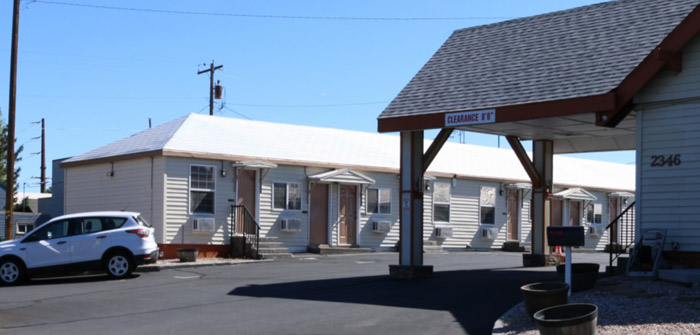(Project Turnkey Bend | Photo Courtesy of Oregon Community Foundation)
Oregon Community Foundation (OCF) has announced that it has selected the City of Bend to receive a $2.97 million Project Turnkey grant and the Joint Office of Homeless Services | JOHS (for East Multnomah County) to receive a $3.45 million Project Turnkey grant to purchase and convert area motels into transitional housing for community members in need.
The latest grants were made possible through additional funding of $9.7 million approved by the Oregon Legislature and signed by Governor Kate Brown on June 25, bringing the Project Turnkey funding total to $74.7 million.
“Project Turnkey is wrapping up with 19 total properties throughout 13 counties in Oregon, realizing approximately 900 beds/units with these latest two grant announcements,” said Megan Loeb, program officer of Oregon Community Foundation.
Project Turnkey represents about a 20 percent increase in the state’s supply of emergency year-round shelter beds for people experiencing homelessness, achieved in less than eight months.
Project Turnkey-Bend | City of Bend and NeighborImpact
A $2.97 million Project Turnkey grant will help the City of Bend support Bend community members experiencing homelessness. Project Turnkey-Bend will house community members in need, particularly those disproportionately impacted by COVID-19, including tribal members, veterans, survivors of domestic violence and Latina/o/x community members. It will be operated in collaboration with NeighborImpact, which will provide supportive services to guests.
“We are thrilled to receive this funding from Project Turnkey,” said Bend City Councilor Megan Perkins. “Supporting our community members who are unhoused or at risk of losing housing is a top priority for the City Council. This state funding will enable us to open a much-needed transitional shelter in Bend and provide safe housing for our neighbors who need it most.”
Located at 2346 NE Division Street in Bend, the City of Bend anticipates use of the 28-room property as early as this winter. Following improvements, including fire, life and safety systems upgrades, the property will offer three fully accessible units as well as three units with visual indicators and audio annunciators to serve guests with hearing and visual impairments.
“Oregon Community Foundation is thrilled to partner with the City of Bend and NeighborImpact, an incredible organization and community member, on this innovative Project Turnkey effort to benefit Bend community members experiencing homelessness,” said Julie Gregory, OCF’s regional director for Central and Eastern Oregon. “As Central Oregon’s housing market faces limited supply and increased demand, we know many people are struggling with housing security.”
Key benefits of Project-Turnkey-Bend — to be operated in partnership with NeighborImpact– include:
- Safe accommodation and support with 28 rooms for Bend community members in need
- Provision of essentials such as clothing, hygiene items, meals, showers, etc.
- Help to move people experiencing homelessness from crisis to stability.
- Culturally specific, supportive services for tribal members, veterans, survivors of domestic violence and Latina/o/x community members, including:
- On-site case management
- Health care, including mental health services
- Resource navigation
- Linkages to permanent housing solutions.
“Central Oregon has experienced recent tragic losses among our vulnerable unhoused neighbors,” said Scott Cooper, executive director, NeighborImpact. “This partnership is a first step in support of those at highest risk of succumbing to our harsh elements and who may not be welcomed into other shelters.”
Project Turnkey-East Multnomah County | Joint Office of Homeless Services (JOHS)
The $3.45 million Project Turnkey grant will help JOHS support vulnerable community members experiencing homelessness. Project Turnkey-East Multnomah County provides services-focused shelter for community members in need, particularly people who identify as BIPOC, people who have high-risk underlying health conditions, people who are 65 or older and veterans. Do Good Multnomah, through a contract with JOHS, is operating the site.
“Using motels to provide specialized shelter for our neighbors most vulnerable to COVID-19 unquestionably saved lives during the pandemic,” said Chair Deborah Kafoury. “The support services and stability we can provide in motel-based shelters will be just as important as the pandemic eases. Thanks to support from Project Turnkey, I’m grateful we’ll be able to continue providing this resource.”
JOHS is already utilizing the 43-room property, located at 10323 SE Stark in Gresham, Oregon, to shelter and support some of the most vulnerable community members in East Multnomah County. The site was part of JOHS’ strategy for retaining shelter capacity despite the need for physical distancing throughout its shelter system. The Project Turnkey grant, combined with $1.5 million in locally supplied funds, will enable the JOHS to acquire the property.
Key benefits of Project-Turnkey-East Multnomah County — operated by Do Good Multnomah (with support from several other nonprofit partners) — include:
- Safe accommodation and support for up to 43 community members in need
- Provision of essentials such as clothing, hygiene items, meals, showers, etc.
- Help to move people experiencing homelessness from crisis to stability
- Culturally responsive, supportive services for guests, including:
- Employment services
- Health care, including behavioral health services
- Housing placement
- Resource navigation
“The Advisory Committee appreciated the intentionality of both of these applicants to serve the most disproportionately impacted Oregonians in the face of our housing crisis,” Megan Loeb, program officer at Oregon Community Foundation, said. “Centering racial equity has been a key tenet of this work, and it’s reflected in grantees selected throughout this process.”
Oregon Community Foundation offers support for Oregon’s housing needs along a continuum — from shelter to supportive housing to affordable housing to equitable home ownership — through a variety of tools, including research, grants, advocacy and low-interest loans. OCF’s administration of Project Turnkey is one example of the innovative, collaborative approaches launched to help more Oregonians find stable, affordable housing.



